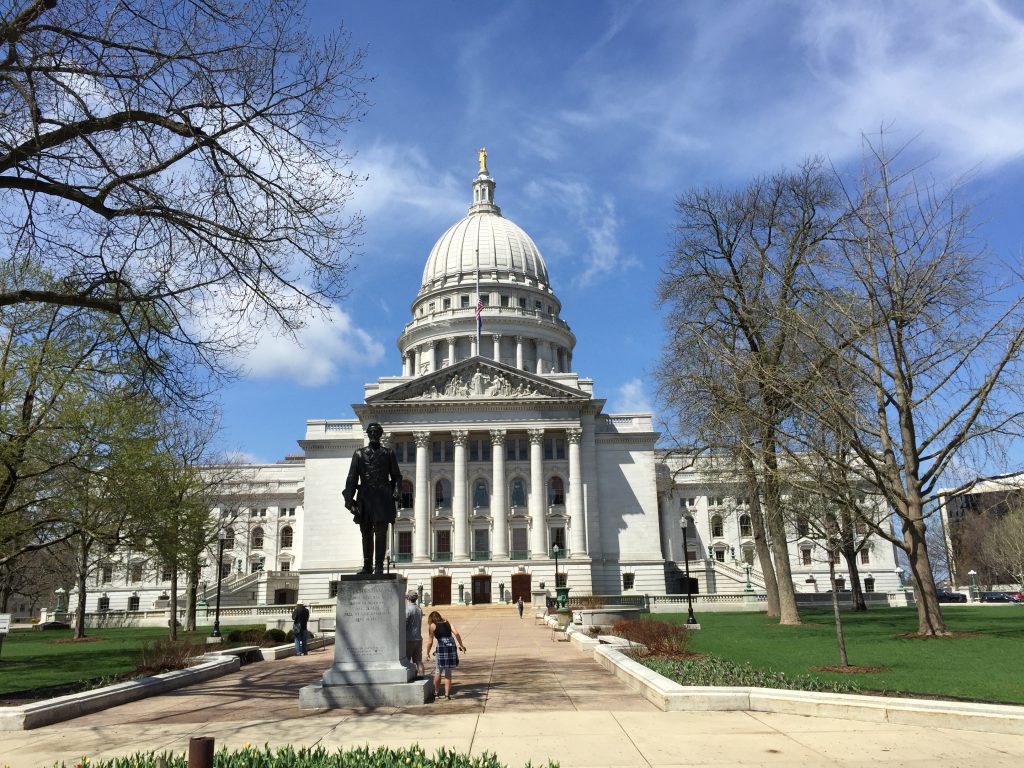Bill Would Make Damaging Historical Property a Felony
Sponsors bring up damage to statues during 2020 Black Lives Matter protests.
Damaging or leaving graffiti on a historical monument like a statue, plaque, or painting on public land could become a class I felony in the state of Wisconsin. At least, that’s the goal of a bill authored by Rep. Andre Jacque (R-DePere) and Rep. William Penterman (R-Columbus) introduced to the Assembly Committee on Criminal Justice and Public Safety. The bill is a direct response to damage inflicted on historical statues during Black Lives Matter protests in the summer of 2020.
Two statues on the grounds of the Capitol in Madison were damaged during the early days of the marches. One was Lady Forward, which was originally created in 1893 and of which a replica was erected in 1996. The statue depicts a woman standing with one arm outstretched, and the other clasping an American flag. It’s said to represent Wisconsin’s “forward” motto, and was purchased by women’s suffrage organizations on behalf of their movement.
Penterman said during the committee hearing on Wednesday that the statues “represent the valor of all Wisconsinites.” He added that they have been restored, but added that they should never have been damaged in the first place. “There should not be a license to destroy public property and to cause damage through a civil unrest,” Penterman said. He called the proposed felonies “a common sense extension of penalties that are already in place.”
Some members of the committee questioned the necessity for the bill, as damaging property is already illegal. Rep. Tip McGuire (D-Kenosha) also questioned in what situations the bill would be applied. McGuire asked, “Why graffiti? I guess, you know, if a 19-year-old college student on St. Patrick’s day gets green paint on Hans Christian Heg, do you want them to be charged with a felony?”
Jacque stated that although existing statutes grant discretion to prosecutors pursuing vandalism charges, he felt it remains necessary to specifically include historical property on public land. “This is, I think, more comprehensively re-writing the statute as it was intended to be written in the first place to be able to include that historically significant property,” he explained. “We already have increased penalties for damage to churches or cemeteries. And I think if you are doing damage to historically significant property or, you know, something like a law enforcement memorial in the Capitol that has seen graffiti in the past, I do think that having the option to charge that greater penalty is appropriate.”
Jacque honed in on the unrest of 2020 in justifying his bill. “When you look at disrespect for the rule of law, order,” he said, “things we saw, things here in the Capitol, things we saw in Kenosha, things we saw with public buildings, things we saw with correctional facilities … any of those, I believe if you have damage that is done to the people’s buildings, the people’s history and monuments, I believe [that should be punished] across the board,” said Jacque.
Rep. David Bowen asked how the use of materials such as spray chalk, which washes off with water or rain, would be treated under the proposed legislation. Legislative counsel responded, “that’s an interesting question,” and said answering it would require further review. Impermanent chalk, spray chalk, and similar items were commonplace during the 2020 protests. Marchers chalked messages on sidewalks and streets. Chalk was used to create messages and art on the walls of the Milwaukee County Jail and Safety Building during the early summer. The messages washed away within days.
Other legislators , including Rep. David Steffen (R-Green Bay) expressed the view that the problem lies with prosecutors who decline to pursue the stiffest penalties possible for damage to property. At bottom, however, Jacque and some committee members said the penalties were about more than monetary value. “This is kind of an exception to that,” said Rep. Shae Sortwell (R-Two Rivers). “Kind of regardless of the monetary impact, we’re going to place this at a certain level. It’s at a higher importance than its monetary value.” Becoming emotional as he recounted some of Heg’s biography, Jacque responded, “I believe that there is a greater penalty that should apply.” A class I felony can carry up to three and one-half years in state prison, and fines up to $10,000.
Damage to historical properties could become class I felony was originally published by the Wisconsin Examiner.
More about the Madison Unrest
- Bill Would Make Damaging Historical Property a Felony - Isiah Holmes - Jan 9th, 2022
- Madison Protester Gets Probation on Extortion Charges - Shamane Mills - Jan 28th, 2021
- Aggressive Police Escalate Violence at Protests? - Clara Neupert - Dec 10th, 2020
- Two Charged with Arson During Civil Unrest in Madison, Wisconsin - U.S. Department of Justice - Sep 23rd, 2020
- Data Wonk: Who Benefits From the Madison Vandalism? - Bruce Thompson - Jul 1st, 2020
- I Sincerely Appreciate Your Kind Words of Support! - State Sen. Tim Carpenter - Jun 30th, 2020
- Op Ed: Madison Protests Targeted ‘Fake Liberalism’ - Ruth Conniff - Jun 29th, 2020
- Everybody Wants Action From Gov. Evers - Melanie Conklin - Jun 29th, 2020
- Madison Protester Faces Heavy Charges - Rachael Vasquez - Jun 29th, 2020
- What Happened at Madison’s Protests - Bruce Murphy - Jun 24th, 2020
Read more about Madison Unrest here






















